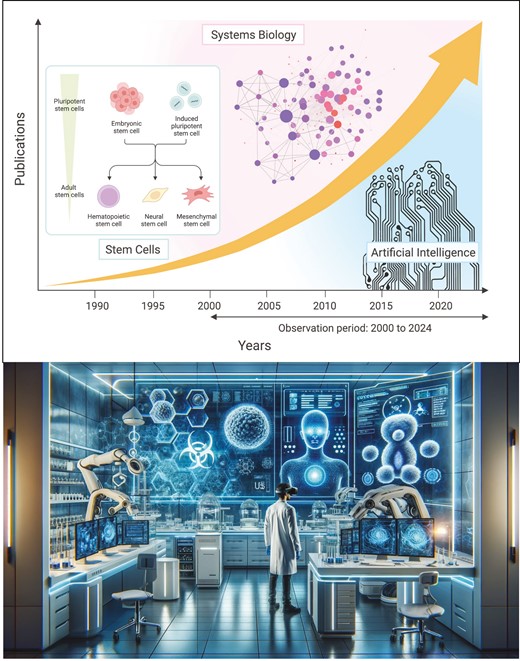The global evolution and impact of systems biology and artificial intelligence in stem cell research and therapeutics development: a scoping review.
Advanced bioinformatics analysis, such as systems biology (SysBio) and artificial intelligence (AI) approaches, including machine learning (ML) and deep learning (DL), is increasingly present in stem cell (SC) research. An approximate timeline on these developments and their global impact is still lacking. We conducted a scoping review on the contribution of SysBio and AI analysis to SC research and therapy development based on literature published in PubMed between 2000 and 2024. We identified an 8 to 10-fold increase in research output related to all 3 search terms between 2000 and 2021, with a 10-fold increase in AI-related production since 2010. Use of SysBio and AI still predominates in preclinical basic research with increasing use in clinically oriented translational medicine since 2010. SysBio- and AI-related research was found all over the globe, with SysBio output led by the (US, n = 1487), (UK, n = 1094), Germany (n = 355), The Netherlands (n = 339), Russia (n = 215), and France (n = 149), while for AI-related research the US (n = 853) and UK (n = 258) take a strong lead, followed by Switzerland (n = 69), The Netherlands (n = 37), and Germany (n = 19). The US and UK are most active in SCs publications related to AI/ML and AI/DL. The prominent use of SysBio in ESC research was recently overtaken by prominent use of AI in iPSC and MSC research. This study reveals the global evolution and growing intersection among AI, SysBio, and SC research over the past 2 decades, with substantial growth in all 3 fields and exponential increases in AI-related research in the past decade.
Authors
Silva-Sousa T, Usuda JN, Al-Arawe N, Frias F, Hinterseher I
External link
Publication Year
Publication Journal
Associeted Project
Systems Immunology of Human Diseases
Lista de serviços
-
RASL11A, member of a novel small monomeric GTPase gene family, is down-regulated in prostate tumors.RASL11A, member of a novel small monomeric GTPase gene family, is down-regulated in prostate tumors.
-
Splice variants of TLE family genes and up-regulation of a TLE3 isoform in prostate tumors.Splice variants of TLE family genes and up-regulation of a TLE3 isoform in prostate tumors.
-
Concepts on Microarray Design for Genome and Transcriptome AnalysesConcepts on Microarray Design for Genome and Transcriptome Analyses
-
The iron stimulon of Xylella fastidiosa includes genes for type IV pilus and colicin V-like bacteriocins.The iron stimulon of Xylella fastidiosa includes genes for type IV pilus and colicin V-like bacteriocins.
-
Origins of the Xylella fastidiosa prophage-like regions and their impact in genome differentiation.Origins of the Xylella fastidiosa prophage-like regions and their impact in genome differentiation.
-
The role of prophage in plant-pathogenic bacteria.The role of prophage in plant-pathogenic bacteria.
-
Genetic control of immune response and susceptibility to infectious diseases.Genetic control of immune response and susceptibility to infectious diseases.
-
Building capacity for advances in tuberculosis research; proceedings of the third RePORT international meeting.Building capacity for advances in tuberculosis research; proceedings of the third RePORT international meeting.
-
São Paulo School of Advanced Sciences on Vaccines: an overview.São Paulo School of Advanced Sciences on Vaccines: an overview.
-
A reasonable request for true data sharing.A reasonable request for true data sharing.

